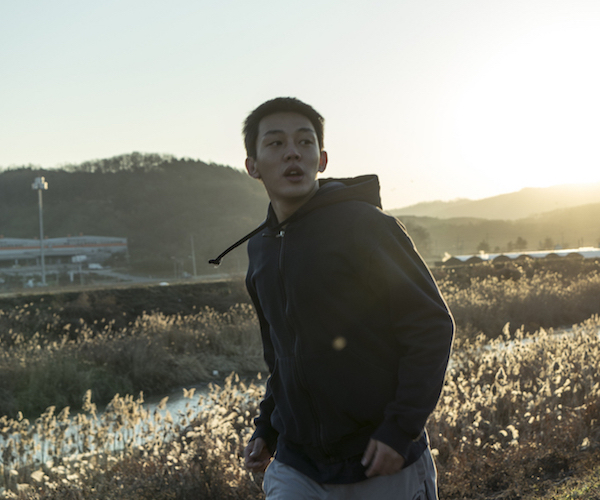Film Review: “Burning” — A Powerful Philosophical Suspense Yarn
Not since Michelangelo Antonioni’s Blow-Up and L’Aventura has there been such a mesmerizing tale of the more you look, the less you find out.
Burning directed by Lee Chang-dong. Screening at Kendall Square Cinema.

A scene from “Burning.”
By Gerald Peary
Is there a cat? Isn’t there a cat? Is it always hiding under the bed and sofa, or is a phantom feline? Jong-Soo (Yoo Ah-Hin) puts food out for it for many weeks but never knows if the kitty he’s feeding exists. And that’s one of the many, many mysteries, invariably unsolvable, in Chang-Dong Lee’s Burning, a potent metaphysical thriller from South Korea based on a Haruki Murakami short story. (Entitled “Barn Burning,” in mischievous homage to the William Faulkner tale of the same name.)
Jong-Soo begins his journey with a lucky day. A country boy floundering in Seoul, unemployed despite his college degree, Jong-Soo runs into a young woman from his hometown, a gorgeous one, Hae-Mi (Jeon Jang-Soo). She invites him to her tiny apartment, they quickly couple (a very erotic scene), and it looks like he’s got a girlfriend. But she’s a seeker, and she’s saved money to travel to Africa and spiritually find herself. Would he feed her cat while she’s away?
Hae-Mi leaves for Kenya, Jong-Soo comes obediently to fill a bowl with dry food for the elusive puss. He misses his new love desperately, and stands in her flat masturbating in seeming memory of their hot sex. While Hae-Mi travels abroad, Jong-Soo, a fan of Faulkner, is supposed to be writing a novel. That’s getting nowhere. The closest he gets to literature is cursing South Korea as a land of Gatsbys. Meanwhile, he moves home to his family’s dilapidated farm near the North Korean border. The rural tranquility is disrupted by Communist propaganda blaring from the hills above.
Jong-Soo lives alone. His mother disappeared decades ago. His stubborn, violent father has been arrested and faces a jail sentence. The father’s legacy is a closet filled with lethal knives.
At last, Hae-Mi calls to have Jong-Soo pick her up at the airport. When he gets there, Jong-Soo is crushed. Hae-Mi has returned from Africa with another man. He’s Ben (Steven Yeun), an American-named South Korean yuppie. He’s everything that Jong-Soo is not: rich, handsome, smoothly confident, owner of a Porsche and a luxurious apartment, and clearly a lady killer. In a literal sense perhaps? Jong-Soo searches Ben’s bathroom and finds a drawer filled with random objects once owned by females: earrings, bracelets, etc.
It’s another riddle as with the cat, though far more consequential. We in the audience ponder the possibilities. Did women accidentally leave these objects behind? Or were they given to Ben as mementos of his sexual conquests? Or—the horror!—are they leftovers from The Disappeared? Is Ben a Bluebeard? A Landru? Anything is possible with this always smiling man, who, without guilt, confesses to Jong-Soo his pathological obsession. He rides around South Korea burning down greenhouses. In fact, he’s torched a greenhouse close to where Jong-Soo lives.
Has he? Jong-Soo can’t locate the ashes of the greenhouse. Also, Hae-Mi claims that, in childhood, she fell into a neighborhood well. Jong-Soo can’t locate the well. Ultimately, he can’t locate Hae-Mi. In the middle of her tryst with Ben, she disappears off the face of the earth. Without blinking, Ben switches affections to another beautiful young woman. Jong-Soo discovers that Ben’s new lover has a real cat, which seems to answer to “Boil,” the name of Hae-Mi’s supposed cat!
Mysteries, mysteries. Not since Michelangelo Antonioni’s Blow-Up and L’Aventura has there been such a mesmerizing tale of the more you look, the less you find out. And there’s a final unanswerable. Who really is the psychopath?
Bad Ben? Or passive, phlegmatic Jong-Soo, who, like Emile Zola’s unfortunate 19th century protagonists, is doomed by heredity, inheriting his father’s sanguinary temperament?
Gerald Peary is a Professor Emeritus at Suffolk University, Boston, curator of the Boston University Cinematheque, and the general editor of the “Conversations with Filmmakers” series from the University Press of Mississippi. A critic for the late Boston Phoenix, he is the author of nine books on cinema, writer-director of the documentaries For the Love of Movies: the Story of American Film Criticism and Archie’s Betty, and a featured actor in the 2013 independent narrative Computer Chess. He is currently at work co-directing with Amy Geller a feature documentary, The Rabbi Goes West.
